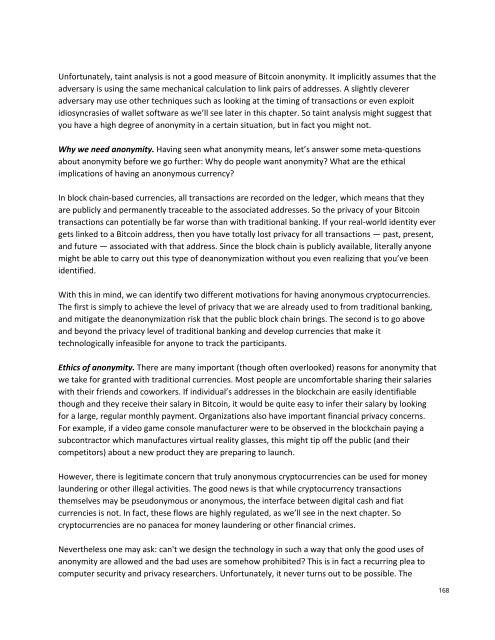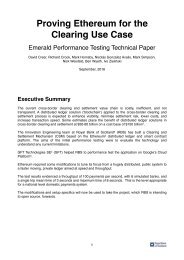Bitcoin and Cryptocurrency Technologies
1Qqc4BN
1Qqc4BN
You also want an ePaper? Increase the reach of your titles
YUMPU automatically turns print PDFs into web optimized ePapers that Google loves.
Unfortunately, taint analysis is not a good measure of <strong>Bitcoin</strong> anonymity. It implicitly assumes that the<br />
adversary is using the same mechanical calculation to link pairs of addresses. A slightly cleverer<br />
adversary may use other techniques such as looking at the timing of transactions or even exploit<br />
idiosyncrasies of wallet software as we’ll see later in this chapter. So taint analysis might suggest that<br />
you have a high degree of anonymity in a certain situation, but in fact you might not.<br />
Why we need anonymity. Having seen what anonymity means, let’s answer some meta-questions<br />
about anonymity before we go further: Why do people want anonymity? What are the ethical<br />
implications of having an anonymous currency?<br />
In block chain-based currencies, all transactions are recorded on the ledger, which means that they<br />
are publicly <strong>and</strong> permanently traceable to the associated addresses. So the privacy of your <strong>Bitcoin</strong><br />
transactions can potentially be far worse than with traditional banking. If your real-world identity ever<br />
gets linked to a <strong>Bitcoin</strong> address, then you have totally lost privacy for all transactions — past, present,<br />
<strong>and</strong> future — associated with that address. Since the block chain is publicly available, literally anyone<br />
might be able to carry out this type of deanonymization without you even realizing that you’ve been<br />
identified.<br />
With this in mind, we can identify two different motivations for having anonymous cryptocurrencies.<br />
The first is simply to achieve the level of privacy that we are already used to from traditional banking,<br />
<strong>and</strong> mitigate the deanonymization risk that the public block chain brings. The second is to go above<br />
<strong>and</strong> beyond the privacy level of traditional banking <strong>and</strong> develop currencies that make it<br />
technologically infeasible for anyone to track the participants.<br />
Ethics of anonymity.There are many important (though often overlooked) reasons for anonymity that<br />
we take for granted with traditional currencies. Most people are uncomfortable sharing their salaries<br />
with their friends <strong>and</strong> coworkers. If individual’s addresses in the blockchain are easily identifiable<br />
though <strong>and</strong> they receive their salary in <strong>Bitcoin</strong>, it would be quite easy to infer their salary by looking<br />
for a large, regular monthly payment. Organizations also have important financial privacy concerns.<br />
For example, if a video game console manufacturer were to be observed in the blockchain paying a<br />
subcontractor which manufactures virtual reality glasses, this might tip off the public (<strong>and</strong> their<br />
competitors) about a new product they are preparing to launch.<br />
However, there is legitimate concern that truly anonymous cryptocurrencies can be used for money<br />
laundering or other illegal activities. The good news is that while cryptocurrency transactions<br />
themselves may be pseudonymous or anonymous, the interface between digital cash <strong>and</strong> fiat<br />
currencies is not. In fact, these flows are highly regulated, as we’ll see in the next chapter. So<br />
cryptocurrencies are no panacea for money laundering or other financial crimes.<br />
Nevertheless one may ask: can't we design the technology in such a way that only the good uses of<br />
anonymity are allowed <strong>and</strong> the bad uses are somehow prohibited? This is in fact a recurring plea to<br />
computer security <strong>and</strong> privacy researchers. Unfortunately, it never turns out to be possible. The<br />
168









